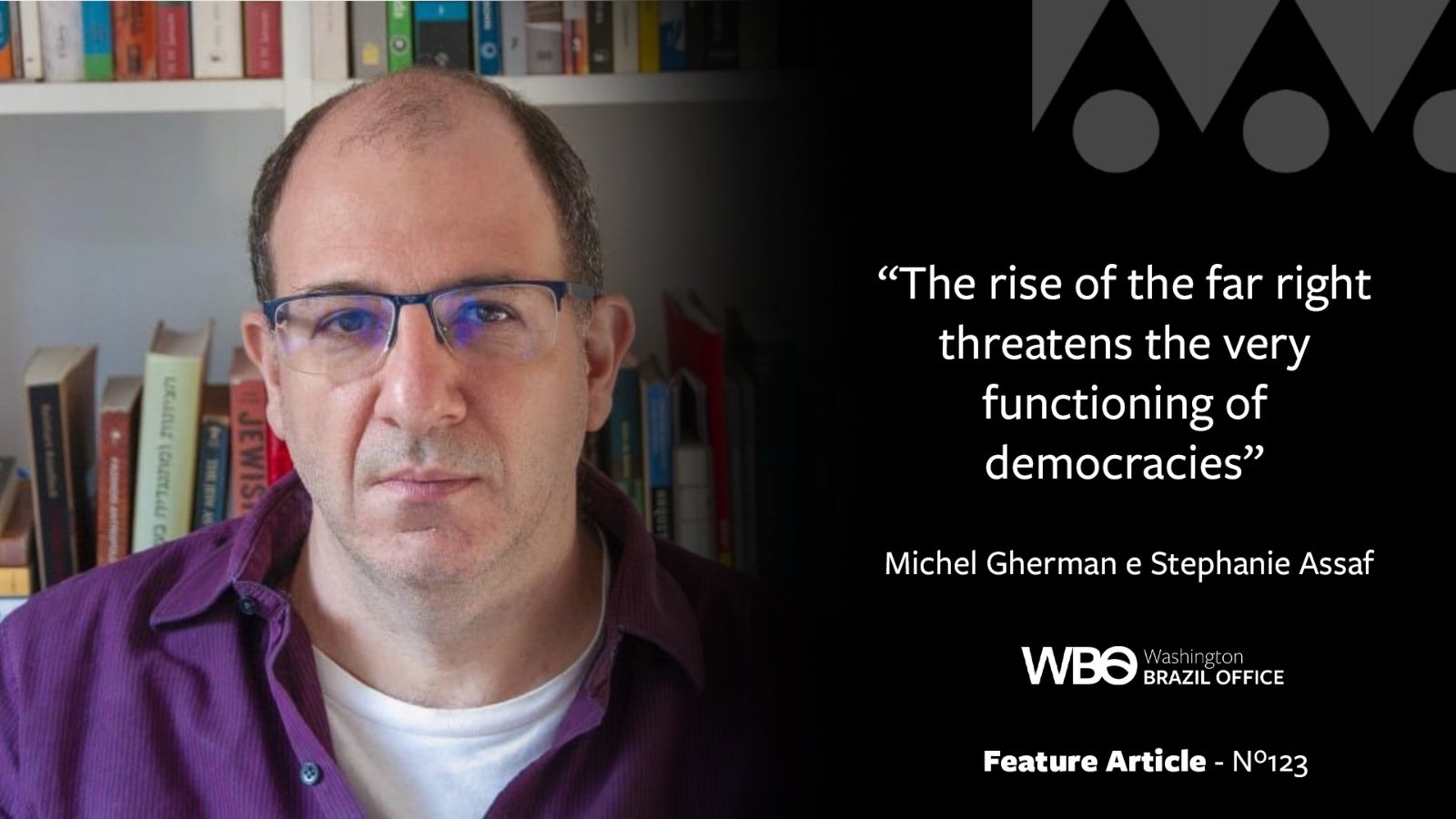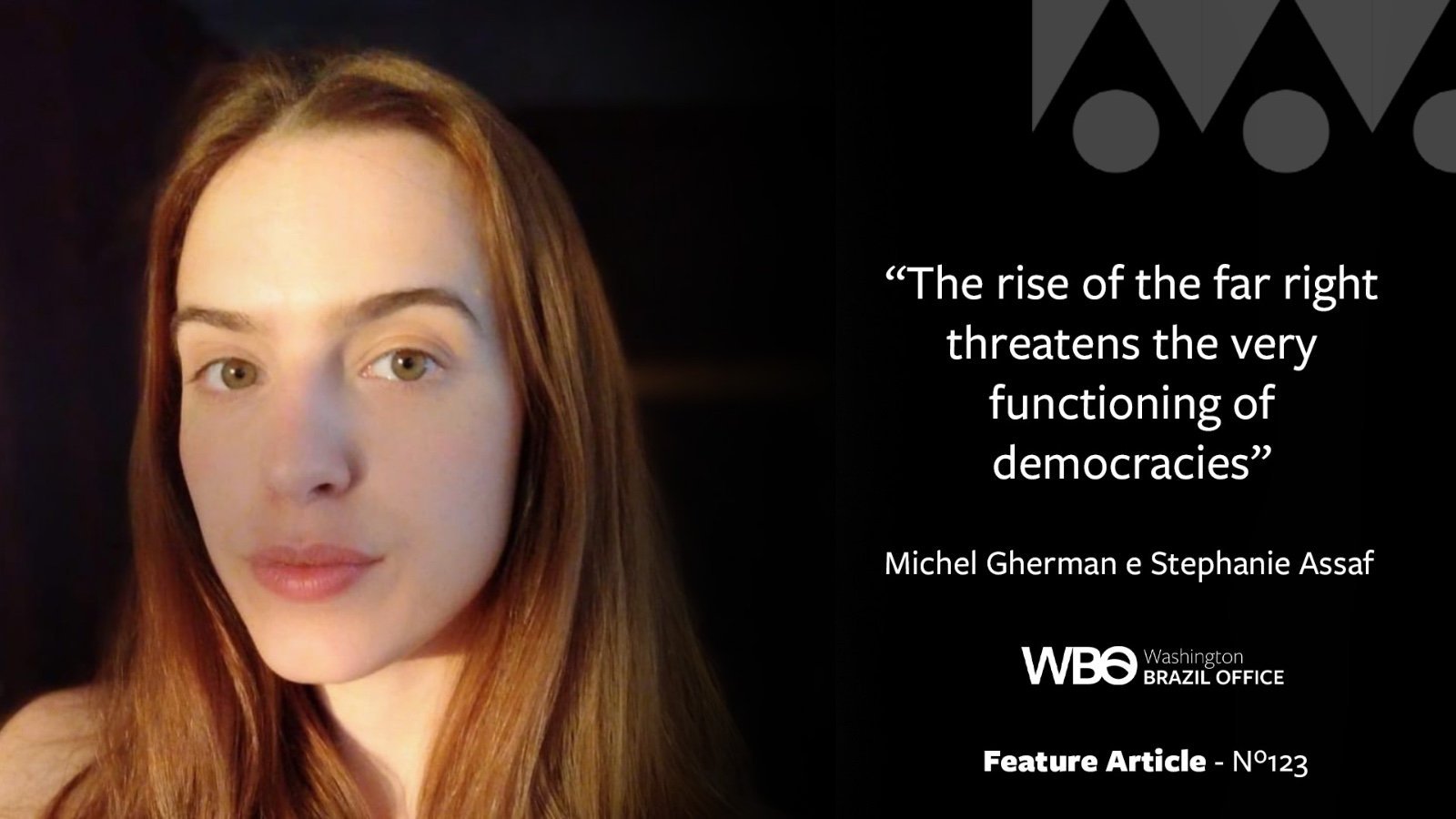The Expansion of the New Extreme Right
By Michel Gherman* and
Stephanie Assaf**
This article was written for issue 123 of the WBO weekly newsletter, published on June 28, 2024. To subscribe to the newsletter and receive it for free, enter your email in the field below.
In mid-June 2024, all major global press outlets reported the fact that the extreme right – or ultra-right, in the definition of some authors – made significant advances in the European elections. As a result of this progress, of the 720 vacancies available in the European Parliament, approximately 130 were allocated to politicians linked to this political field in the various organizations where they are organized.
However, it is important to note that for more than a decade far-right political representatives have been assuming important positions, both in politics and in public management. This has occurred gradually in both the Global North and the Global South. In this context of the rise of the extreme right, there is a growing presence of ultra-conservative politicians elected in several countries. Viktor Orbán has been prime minister of Hungary since 2010; Donald Trump was president of the United States from 2017 to 2021; Jair Bolsonaro was president of Brazil from 2019 to 2022; and Javier Milei was elected president of Argentina in 2023.
Despite being very significant, all the examples above refer only to the highest positions in the government bodies of each State in question, which is already quite important and illustrative of the strength of the extreme right's advances in this century. However, the reach of the extreme right in the global political arena is still much greater than the aforementioned cases illustrate, since, also on a global scale – although widespread and in positions of less relevance – such advances are present in the public sphere and in the world of politics.
The current Brazilian situation is an example. Even though today the president of Brazil is a politician elected from a front of center-left parties, it is important to note that in another branch of the government the situation is different. In the Senate and the Chamber of Deputies, there is a massive and very strong presence of the extreme right at work.
It is also important to realize that outside of governmental bodies, the strength of far-right parties around the world cannot be ignored.
One of the most alarming cases is in Germany. Since its reunification, the country has been predominantly governed by center-right and center-left parties. It turns out that these days its second most relevant political party in terms of popular support is precisely the far-right party Alternative für Deutschland (AfD) that is known for its unrestricted use of references, allusions, and homages to Nazism in its platforms, as well as by its main leaders.
Regardless of the context, the tendency is for this process to continue expanding, at least in the coming years. It is essential to note that this new situation has two complementary and threatening paths as possible consequences. Firstly, the rise of the far right threatens the very functioning of democracies. Secondly, the growth of these groups calls into question the rights of minorities and long-consolidated social and political agreements.
In this aspect, it is essential to highlight that the term extreme right is a kind of umbrella category. In other words, it is a term that includes several different phenomena that converge because of their similarities.
This is a political category that has many historical and social resonances. On the one hand, there are links of continuity and rupture with historical fascism, supposedly defeated in the twentieth century. On the other hand, there are extreme right-wing positions today that relate not only to regimes and governments, but also to anti-politics and “anti-system” positions.
The possibility of “politics,” properly speaking, understood as the existence of groups with different positions in a position of equality in the public debate, is what guarantees democracies. A refusal to follow this political arrangement not only threatens the rules of the democratic game, but also, not infrequently, makes clear nods toward authoritarian ideologies and regimes.
It is no coincidence that the politician Jair Bolsonaro, for example, refers in such a positive and constant way to the civil-military dictatorship that ruled Brazil between 1964 and 1985. In addition to the denial of politics – often performed as being anti-system – there are other equally dangerous ideas that reflect these ideologies and groups that are referred to as extreme right-wing. They are campaigns promoting xenophobia, racism, and various prejudices against minority groups.
With their due differences, such efforts represent not only the denial, but also the repudiation of an “other,” which may be different from the subject referred to. This “different” being, who is not accepted by such groups, is classified in this way because this person or this group is not from the same country or of the same race, or has a non-normative sexual orientation, just to name a few examples.
For other subjects and from the hegemonic perspective of the extreme right, there is a real possibility of denying rights guaranteed in a democratic State. But also, as has already been seen in the past, the denial of full citizenship rights can lead to the dehumanization of such subjects and the groups to which they are linked. In short, the very denial of the other as a political project.
*Michel Gherman is graduated in history from the Federal University of Rio de Janeiro (UFRJ). He has a master’s degree in anthropology from the Hebrew University of Jerusalem and a doctorate in history from UFRJ . He did postdoctoral studies in social history at the same university and at the Ben Gurion Center for Israeli and Zionist Studies. He has publications in the areas of contemporary history, political history, political anthropology, studies on Zionism and Israel, the Palestinian-Israeli conflict and the Middle East, and on the Far Right and Judaism in Brazil. He is currently a professor in the Department of Sociology at UFRJ in the Postgraduate Program in Social History, where he coordinates the Interdisciplinary Center for Jewish and Extreme Studies – Laboratory of Religion, Violence and Politics. He is also a collaborator with the Brazil Israel Institute.
**Stephanie Assaf is an architect and urban planner from the Federal University of Minas Gerais (UFMG). She holds a master’s degree in social anthropology from UFMG; a specialization in urban policy and planning from the UFRJ, and doctorate in urban and regional planning from the same university. She is currently doing a postdoctoral internship under the supervision of Michel Gherman at UFRJ where she researches the themes of the city and the extreme right in the twenty-first century with an emphasis on the Brazilian context and Bolsonarism, as well as issues related to language, space, and the public sphere. She works with themes of the city and culture, major urban projects and interventions, historical fascism and the contemporary extreme right-wing.


